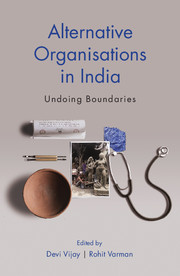Book contents
- Frontmatter
- Dedication
- Contents
- List of Tables and Figures
- Acknowledgements
- Chapter 1 Introduction: Undoing Boundaries
- Chapter 2 Formal and Informal Technologies of Alternative Organisational Spaces within the State: An Analysis of Violence, Wrongdoing and Policing
- Chapter 3 Scripting Alternative Images: Institutions, Practices and Scripts of the Mritshilpis of Kumortuli
- Chapter 4 Shelter for Homeless: Ethnography of Invisibility and Self-exclusion
- Chapter 5 Alternative Spaces of Employment Generation in India: Informal Rules, Structures, and Conflicting Organisational Requirements
- Chapter 6 Shaheed Hospital: Alternative Organisation, Ideology and Social Movement
- Chapter 7 Acting for Change: A Circuits of Power Analysis of a Denotified Nomadic Tribe and Budhan Theater's Struggle for Change
- Chapter 8 Swaraj: An Alternative University
- Chapter 9 Alternative Organisations: Spaces for Contestation
- Contributors
- Index
Chapter 2 - Formal and Informal Technologies of Alternative Organisational Spaces within the State: An Analysis of Violence, Wrongdoing and Policing
Published online by Cambridge University Press: 05 April 2018
- Frontmatter
- Dedication
- Contents
- List of Tables and Figures
- Acknowledgements
- Chapter 1 Introduction: Undoing Boundaries
- Chapter 2 Formal and Informal Technologies of Alternative Organisational Spaces within the State: An Analysis of Violence, Wrongdoing and Policing
- Chapter 3 Scripting Alternative Images: Institutions, Practices and Scripts of the Mritshilpis of Kumortuli
- Chapter 4 Shelter for Homeless: Ethnography of Invisibility and Self-exclusion
- Chapter 5 Alternative Spaces of Employment Generation in India: Informal Rules, Structures, and Conflicting Organisational Requirements
- Chapter 6 Shaheed Hospital: Alternative Organisation, Ideology and Social Movement
- Chapter 7 Acting for Change: A Circuits of Power Analysis of a Denotified Nomadic Tribe and Budhan Theater's Struggle for Change
- Chapter 8 Swaraj: An Alternative University
- Chapter 9 Alternative Organisations: Spaces for Contestation
- Contributors
- Index
Summary
When violence occurs, and nothing happens to those responsible for the violence, what is the nature of society that we create and live in? When the sanctity of human life is cast aside, questions are raised about the credibility and legitimacy of democratic institutions. Life is mobilised by the ruling elites of the state as a political and communicative play to reproduce their power over society. The state is characterised by the site of a durbar where the politics of subservient courtiers structures administrative action. The durbar becomes the centripetal locus of action and other claims of justice are cast aside. The possibility of dissent against the durbar becomes difficult in the wake of organisational dynamics, which marginalise ethical acts of dissent.
We examine these questions of life, death, state, police, riots, violence, investigations and justice in the context of Gujarat. In February 2002, as a part of right wing mobilisation for building a temple in Ayodhya at a site where a mosque had been demolished by rioting mobs in 1992, a few activists were returning from Ayodhya to Gujarat (Jaffrelot, 2012). A train compartment in which they were travelling was burnt leading to the loss of fifty nine lives (Dhattiwala and Biggs, 2012). Following this incident, there were large-scale violent riots in Gujarat directed against Muslims leading to the loss of nearly 2,000 lives (Jaffrelot, 2012). There was widespread sentiment that not only had the state of Gujarat not done enough to prevent the riots but might even have been complicit in the violence directed against Muslims (Noorani, 2004). Dhattiwala and Biggs (2012) argue that the state of Gujarat administratively retaliated against those police officers who tried to uphold law and order by not allowing riots or mass violence to occur, while facilitating the advancement of careers of those police officers who turned a blind eye towards the riots.
Amidst claims of inducement, coercion and intimidation of witnesses in the investigations of riots cases, the Supreme Court of India intervened to constitute a SIT to investigate the riots cases (Mitta, 2014). In this chapter, we explore the politics of the SIT, which was articulated as an alternative organisational space within the state.
- Type
- Chapter
- Information
- Alternative Organisations in IndiaUndoing Boundaries, pp. 26 - 58Publisher: Cambridge University PressPrint publication year: 2017
- 1
- Cited by

